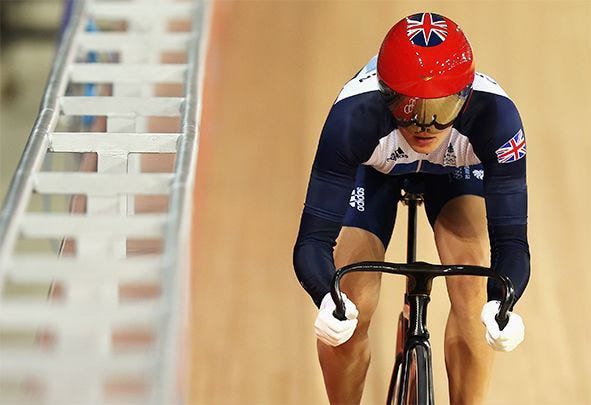January. Sick and tired you’ve been hanging on me.
But in your icy grasp, I get back on track with brain health.

January, you can be such a mean little fucker. In my weeny bit of the Northern Hemisphere, you have been cruel, icy-cold and never ending. About seven weeks long at my last count. You compelled many of us to be ‘dry’, or ‘vegan’ (not me, don’t be silly) and worst of all, you convinced us we are not good enough, so we made you a list of promises that we couldn’t keep.
Being in the grip of another mean little fucker (MS, I’m talking to you now) means I will do everything in my power to live as well as I can, for as long as I can. But much of this ‘living well’ slipped away somewhere last year, so at the beginning of this new one I felt the need to take some steps to get back on track, and yep, make those promises along with everyone else who felt thirsty for a new start.
A few years ago I came across an article (1.), here on Substack, by the awesome Professor Gavin Giovannoni, who I imagine many of you subscribe to. He’s a UK based Neurologist, world-renowned MS expert and researcher and author of the prolific MS-Selfie newsletter.
The article had quite an impact on me at the time I read it. The basic premise is around the holistic management of MS, focusing on things that affect brain health, and adopting a principle of “marginal gains” as a treatment philosophy. And herein lies the place I’ve been working on getting back to since the last of the Christmas chocolates were scoffed sometime around Jan 5th :
"If we break down everything we can think of that goes into improving MS outcomes and then improving it by 1%, we will get a significant improvement when we put them all together.”
“Improving all the little things will maximise your chances of having very good or excellent MS outcomes.”
Professor Giovannoni, MS-Selfie, 2022.
Interestingly, this philosophy is based on an approach taken by British cycling and is credited in part to their historic success:
“The whole principle came from the idea that if you broke down everything you could think of that goes into riding a bike, and then improved it by 1%, you will get a significant increase when you put them all together.”
Sir David Brailsford, Performance Director, British Cycling 1997-2014.
So from bikes, to brains, what, according to the article, can we do to marginally improve our brain health and MS outcomes? We need to look at all the elements that affect brain health such as smoking, excessive alcohol consumption, co-morbidities such as obesity, a sedentary lifestyle, poor sleep, infections, social isolation, loneliness, mental health, and address them as best we can.
Sounds like a lot of work? But back when I first read the paper I realised I had some early wins in the bag on smoking, excessive alcohol and obesity. It’s been a few decades since I had a cheeky cigarette. My love of wine, a nice beer or cocktail is as strong as ever but my consumption has somehow reduced organically to a level I don’t have to lie about when filling in health questionnaires. And, ok, my trousers are tighter than they once were, but I’m not worried. And not necessarily a win but in terms of infections, I’m drinking the water (UTI prevention), having the jabs (respiratory infection prevention), and flossing the teeth (gum disease prevention).
How about the other elements?
Diet

It’s a no brainer for brain health to look at diet. In the New Year, I’m carrying not just the usual festive excesses, but the aftermath of a stressed and time-short period when our daughter was ill. Where ready meals and takeaways ruled, hospital vending machine chocolate was gorged upon daily and the mince pies with clotted cream and icing sugar habit was strong.
I dabbled with dairy free and cutting out red meat when I was first diagnosed with MS, but I came to realise that the evidence was conflicting and that there was really no such thing as an MS specific diet. So I moved on to a more relaxed but as far as possible non-processed diet with an emphasis on plenty of vegetables and plants, but no bans on anything. The no bans makes this totally doable. The non-processed bit is hard. But my breakfast bowl really does look like the one in the photo. MS fatigue and limits on mobility and dexterity means cooking isn’t the joy it once was for me. Or even possible the way it used to be. I buy pre-chopped. I rely on Jase a lot. He’s a great cook, but we also started doing a lot of batch cooking together this year, which means I bark orders read out the recipe and he cracks on. Yes chef!
Exercise

I cannot exercise the way I used to. I used to run, get up for 7am spin class and lift weights at the gym. As with much of life with MS, I have adapted exercise too. At home Yoga, Pilates, my physiotherapy exercises, even a little HIIT (High Intensity Interval Training). The evidence tells me that I must carry on. But as with what I’m eating, this slipped too, even before the stressful events of November/December, I was in a fatigue spiral. And although (maybe counterintuitively) exercise can help to combat fatigue, I struggled to get that balance, or to be in any sort of routine. Apart from the stretches, (oh god the daily stretches), which if I do not do I will live as the tin man from the Wizard of Oz for the rest of the day.
But since early January, my morning exercise routine is happening, it’s becoming established. The first important step was working out exactly what I wanted to do and how long that would take, and build in rest.
I’m getting up half an hour earlier, at 6.30 am. Then between 6.30 and the coffee reward at 8, a combination of 10 mins deep breathing; 15 mins physiotherapy exercises (core, balance etc).; 15 mins stretching; 5 mins HIIT or weights (with room to work up to 15 mins as I progress over time). And on Thursdays I’ve just signed up to a 30 min 7am online weights class (suitable for folks with MS or other physical challenges) to mix things up a little. (2)
On paper, all this sounds gruelling for someone with MS, but even with progressions of the HIIT or weights, it’s half an hour of actual exercise (stretching is oil, not exercises… tin man, get it?!). And crucially it allows time for rest, in between, and at the end before I get on with the day. It has been tough, sometimes it’s felt like I’m just wobbling through. But the early start is already getting lighter, and I remind myself that the routine begins with 10 minutes of deep breathing lying under a thick cosy duvet (whilst Jase is doing his own version of a morning routine, Wim Hof style, lying on ice in shorts on the patio – yes, really!)
Sleep
I can gain some margins of improvement here. I’m learning a lot from my cat. I think this one is also linked with the next section, and the better my mental health, the better the sleep. But it works the other way too. There are MS things that impact sleep, like leg spasms (although if I do my stretches, this is better), and MS and age and possibly menopause related issues too, like having to get out of bed to pee. Temperature regulation, often starting off in bed with absolutely freezing feet and then getting too hot. But I’m guessing also that my mobile screen is a little demon at work against my sleep here, so I signed up to reclaim my brain from my phone.
Social stuff, mental health, stress, isolation
All these things have an impact on brain health. Living with MS can be stressful. I can go for long stretches where I don’t leave the house. Periods of fatigue, getting around being harder due to mobility issues, sometimes just not being bothered to navigate inaccessibility of the world outside my walls, all contribute to this. And although I like my own company, and am lucky to have friends and family who visit and Jase around working from home much of the time, life can lack the vibrancy and spontaneity it once had. And I have been depressed with MS. It’s pretty common.
I can accept these periods of isolation and grow to appreciate and sometimes relish them, they give me time to write, read, and relax with my husband cat. But, I love going to restaurants, and out for coffee. I mustn’t get too comfortable at home. So this year I’m being more proactive with plans with Jase and friends to get out more. And I’m saying yes to more social stuff and not worrying about the fact that I very well might need to cancel later on, depending on symptoms. Everyone who is my friend understands and doesn’t think I’m a flake. And I do have a new set of wheels (a post for another day) which I think will also be a game changer for this area of brain health.
In the brain health article, Prof. G. also asked this:
“I want to know how practical this advice is and whether or not you are practising the marginal gains philosophy in relation to self-managing your MS?”
Yes, I am practising marginal gains. Some elements are easier than others. As someone who has always exercised I can’t imagine how difficult it would be to start from scratch when you’re already struggling with mobility. The healthy, non-processed eating is hard, and as the challenges of MS make this harder for me to do on my own, it puts a burden of extra work onto our household.
Finding new ways of doing things and being resourceful are at the heart of much of it. My HIIT workout for example, is not running on the spot, but vigorous arm swing jogging sitting on the side of the bed (looks pretty funny I imagine).
As someone with Secondary Progressive MS (SPMS) (or as I call it, the one people tend to work towards), and not eligible for the only licensed drug for SPMS in the UK, I don’t feel I have a choice than to try to live by this philosophy. I’m really ok with that. Anyone who sees me attempting to walk might wonder why I’m bothering, or observe that I’m not achieving the “good or excellent” MS outcomes that the approach proposes. But since my mobility started taking a dip those few years ago, and given that I have SPMS, I don’t seem to be on a steep downward trajectory. I’ll take that as a good outcome.
And really, there’s nothing marginal about MS, it’s the big deal, living with it devastating. What it takes from you, the things you can’t do anymore, the grief, and the fear of where it all might go. So adopting this sort of a philosophy in the face of all that gives me a tremendous sense of agency. It gives me a role to play, a plan, the idea that there is something I can do. This action helps me gain back a little control, and although I believe it is doing more, if that’s all it’s doing, I’ll take that too.
So January, you’ve made me have a look at where I am, helped me to make a fresh start, and put brain health first again. Thinking about it you’ve also had some beautiful crisp blue skies, and your Siberian conditions have encouraged me to lie under blankets with warm drinks, slow down and read books. So although I’m now saying goodbye to you with one of your colds from hell, maybe you’re not so mean after all. And anyway its February in a few hours. I made it.
References
Brain Health: how important is it? MS Selfie, 2022.
Taming the Walrus with Veronique Gaulthier-Simmons - exercise classes - newsletter.
Thank you for reading
Jane 💛
If you haven’t already, subscribe to get new posts directly to your email inbox!






Finally reading and so glad I did! Trying to do marginal improvements—the stretching is so boring—but love your exercise routine. I’ll steal that one.
Gorgeous Jane. It's so wonderful to see you getting a little more light into your world after a very dark end to 2024 - literally, figuratively, all of it. Gavin's newsletter is terrific, I am so pleased I found that one, huge community service. And the approach to MS you're taking is the one I try to do to - 1% gains. After all, if the first step is too hard, it's just because you haven't made it small enough.